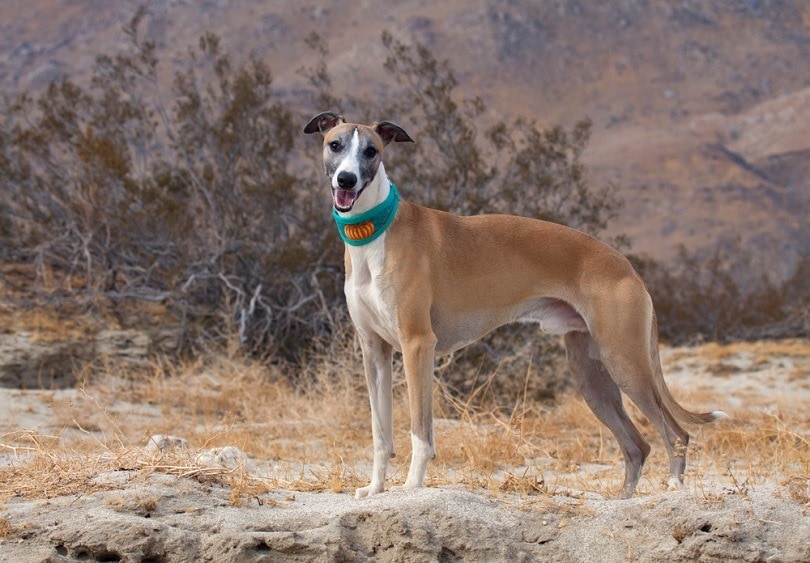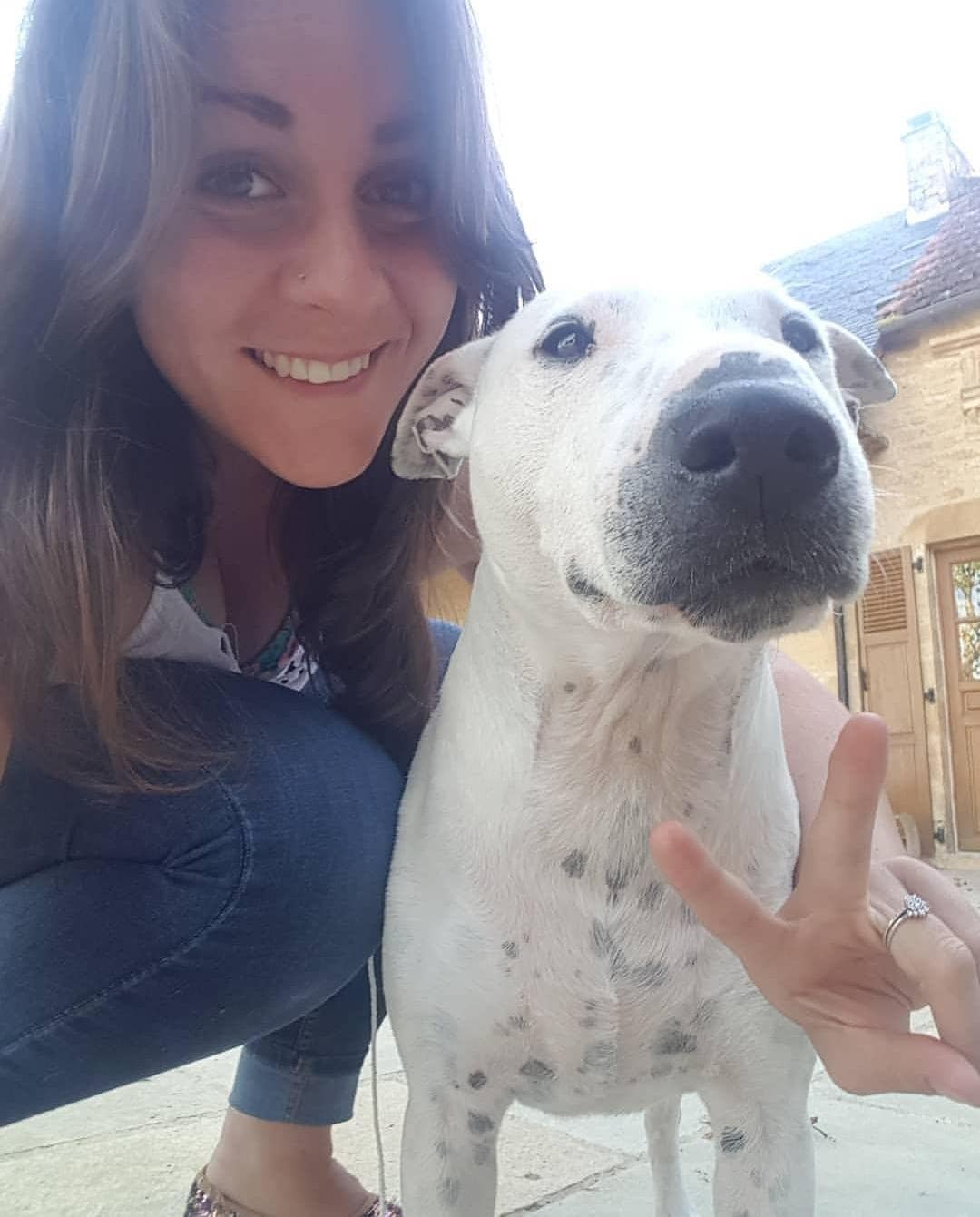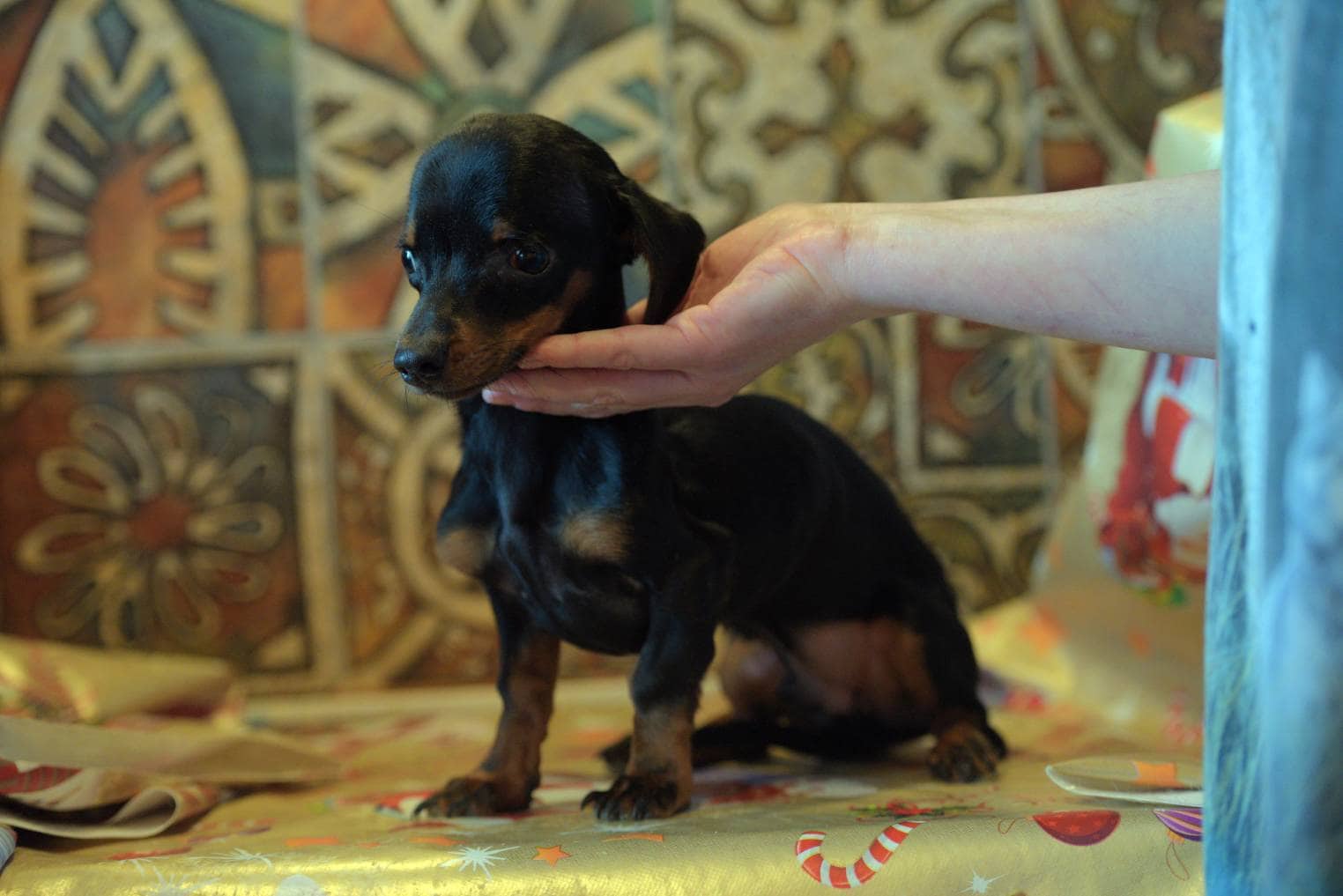Rhodesian Poodle Mix: Care, Pictures, Info & More
Updated on
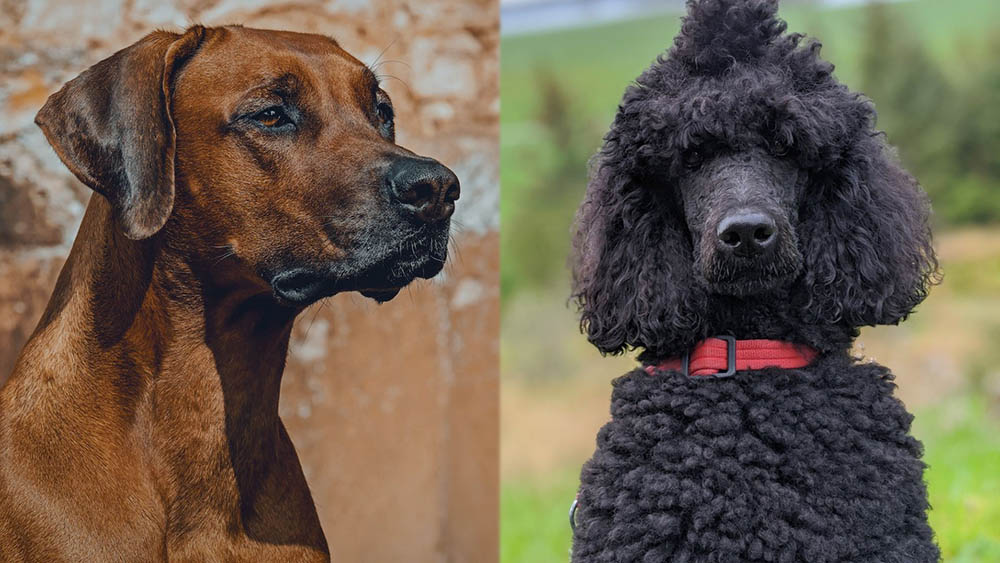
Click to Skip Ahead
When you cross the Poodle with the Rhodesian Ridgeback, you end up with the Rhodesian Poodle Mix, also known as the Rhodoodle. The best way to take a closer look at this mixed breed is to also examine the parent breeds. So, if you’re intrigued by these dogs, keep reading!
Breed Overview
| Height: | 15–24 inches |
| Weight: | 45–80 pounds |
| Lifespan: | 10–14 years |
| Colors: | Wheaten, apricot, blue, black, brown, cream, red, silver, white, light brown, gray |
| Suitable for: | Active families and single people, houses with backyards |
| Temperament: | Energetic, playful, intelligent, sweet, affectionate, protective |
The Rhodesian Poodle Mix comes from two energetic and strong dogs, the Poodle and the Rhodesian Ridgeback. Appearance-wise, the Rhodoodle will likely be medium to large in size, but this depends on the size of the Poodle.
The Ridgeback is a large dog, but Poodles can be standard, miniature, and toy. The entire appearance of the Rhodoodle will depend on which parent they take after most.
Poodles are known for their curly coats, and Ridgebacks have short, sleek coats, so the Rhodoodle will likely have shaggy-looking fur that may or may not show off those famous Poodle curls.
The best way to figure out the offspring’s coat color is to look at the parents. The Poodle can come in myriad colors, and the Ridgeback is a wheaten color that can be pale to a deep red. A Rhodoodle can take on any of their parents’ colors.
Rhodesian Poodle Mix Characteristics
Rhodesian Poodle Mix Puppies
Finding a Rhodesian Poodle Mix will definitely be a challenge! They are quite rare, likely because the Rhodesian Ridgeback isn’t a common breed, particularly in North America.
You’ll want to try social media in order to find one of these dogs. For example, post your interest in the Rhodoodle on various message boards that focus on doodle mixes. You can also try speaking to Rhodesian Ridgeback and Poodle breeders, as they might know of someone who breeds the Rhodoodle.
If you find a reputable breeder, visit them and their kennels if possible so you can see how well they care for their dogs, and then meet the parents of your puppy. You should also request the dog’s medical background and ask the breeder as many questions as necessary.
While adoption might not be available due to the rarity of the Rhodoodle, it still might be worth checking out your local animal shelters and rescue groups.
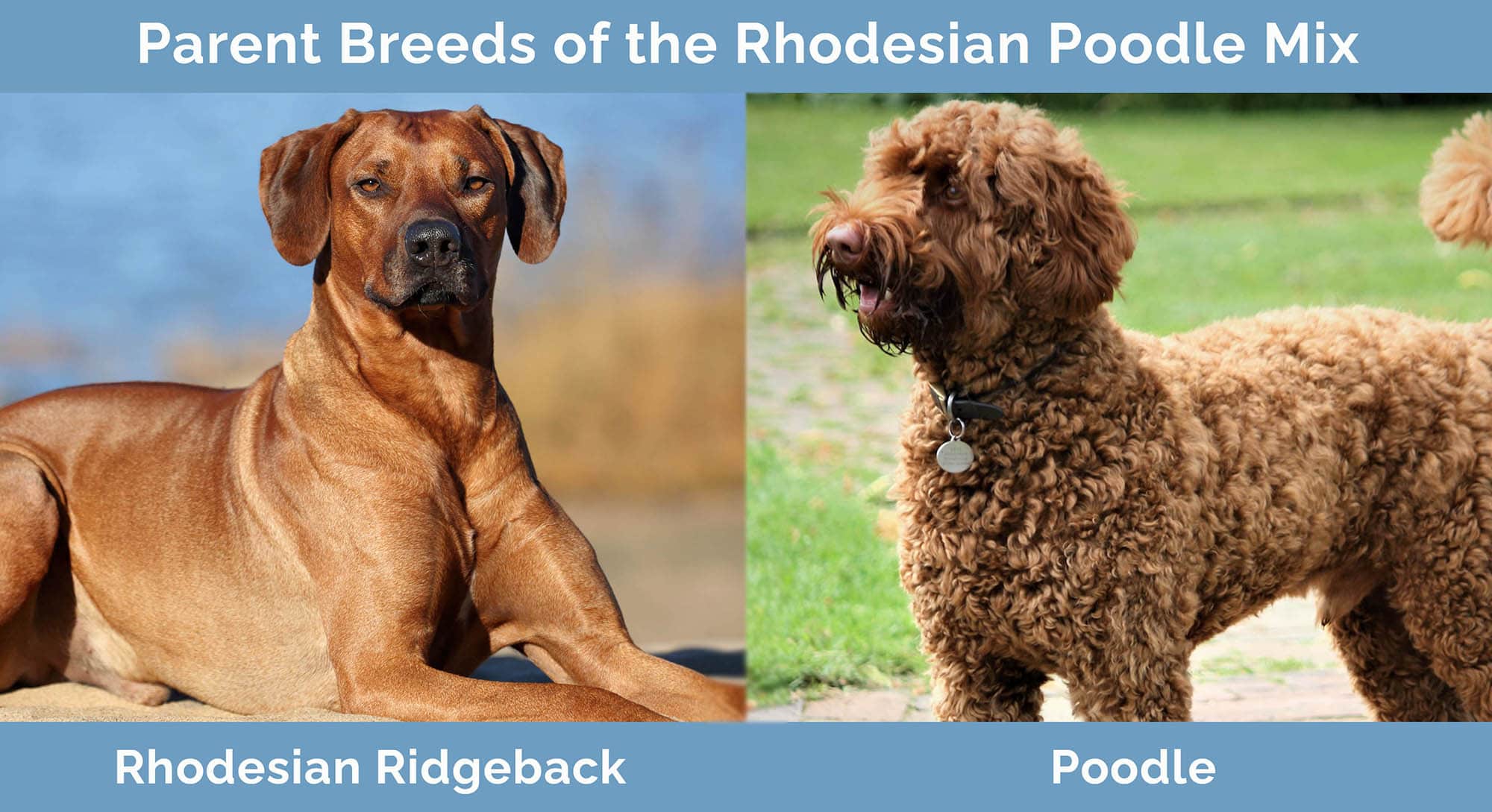
Temperament & Intelligence of the Rhodesian Poodle Mix
Prospective owners should understand the parents to get a better picture of the offspring. The Rhodesian Ridgeback comes from South Africa and was fast and skilled at assisting lion hunters and fending off dangerous predators like baboons and leopards.
Poodles were also bred as hunting dogs in Germany, though with much smaller game, such as ducks. Poodles are high-energy sporting dogs, so when you mash these two breeds together, you’ll have an active, protective, and playful dog in the Rhodoodle.
Poodles are known for their intelligence, as is the Ridgeback, so you’re practically guaranteed a smart Rhodoodle. This breed will also be affectionate and protective of their families.
Are These Dogs Good for Families? 👪
Both the Poodle and Ridgeback are excellent family dogs, which means the Rhodesian Poodle Mix will be too. The parent breeds are affectionate with their families and good with young children. So, if you have kids, the Rhodoodle will make a fantastic companion.
Just be sure to teach your children how to treat dogs with love and respect.
Does This Breed Get Along With Other Pets?
With the right socialization and if the Rhodoodle is raised alongside other pets, they can potentially get along with them. But both the Ridgeback and the Poodle are hunting dogs, so the Rhodoodle will have a high prey drive.
If you have smaller pets like cats or rabbits, it might be best to look for a dog without such a strong prey drive. The Rhodoodle may get along with them, but it might not be worth taking a chance. They should get along with other dogs, though only with proper training and socialization.
Things to Know When Owning a Rhodesian Poodle Mix
Food & Diet Requirements 🦴
Start with high-quality dog food that fits your dog’s current life stage. Your Rhodoodle should eat food that’s appropriate for their current age, weight, and activity level.
Try not to go overboard with treats, and avoid table scraps. There are too many human foods that aren’t good for dogs. You’ll also need to have fresh and clean water available to your dog at all times. This means washing out the water bowl daily.
Exercise 🐕
The Rhodesian Poodle Mix will need quite a bit of exercise. The Poodle generally requires about 1 hour and the Ridgeback 2 hours of exercise daily. The Rhodoodle will likely need between 1 to 2 hours of exercise every day.
This breed will do best with an active and outdoorsy family that can spend a great deal of time walking and playing with the dog.
Training 🎾
Training the Rhodoodle should be relatively easy. The Poodle is intelligent, devoted, and eager to please, so they are quite easily trained. While the Rhodesian Ridgeback is also smart and dedicated, they have an independent and stubborn streak and can be more challenging to train.
Training might be more difficult if the Rhodoodle takes more after their Ridgeback parent, so they’ll need to be trained with a firm and patient hand.
Grooming ✂️
How much grooming the Rhodoodle requires depends on their coat. Poodles have curly coats that are notoriously high maintenance. Rhodesian Ridgebacks are easier to groom due to their short, sleek coats, but they shed a fair bit. The Rhodoodle will likely have a shaggy coat, but how long it is, how much it sheds, and how much curl it has depends on which parent they take after most.
They might need trimming and they will be shedders, but how much they shed depends on the coat. Bathe your Rhodoodle with a good dog shampoo every 1 or 2 months.
Finally, your Rhodoodle will need to have their teeth brushed two to three times a week and their nails trimmed every 3 to 4 weeks, and their ears cleaned about once a week.
Health and Conditions 🏥
Mixed breeds aren’t quite as prone to certain health conditions as their purebred parents. But it’s important to be familiar with a few of the Poodle’s and Rhodesian Ridgeback’s potential health issues, as these might be passed to their offspring. That said, they are just as likely to live a long and healthy life without any sign of these problems.
- Thyroid issues
- Eye problems
- Skin problems
- Hip dysplasia
- Elbow dysplasia
- Luxating patella
- Idiopathic epilepsy
Male vs. Female
One difference between male and female dogs is in size—the males are usually larger than the females. But when it comes to mixed breeds, this is not a fixed rule, as their size depends on which parent they take after more.
You’ll need to have your dog spayed or neutered to prevent unexpected pregnancies and tamp down on negative behaviors like aggression and running away.
 3 Little-Known Facts About the Rhodesian Poodle Mix
3 Little-Known Facts About the Rhodesian Poodle Mix
1. The Rhodoodle might inherit the “ridgeback”
The Rhodesian Ridgeback is called as such due to the ridge of hair along their back that grows backward. This stripe of hair could be passed on to the Rhodoodle, but it might also be hidden by Poodle curls.
2. The Rhodoodle might be smaller than expected
When Standard Poodles are bred with Ridgebacks, most of the resulting Rhodoodles are medium to large in size.
But it’s possible that a toy (10” or smaller) or miniature (10”–15”) Poodle will be used in the breeding, which will give you a smaller-than-expected Rhodesian Poodle Mix.
3. The Rhodoodle is not hypoallergenic
There’s a common misperception that all doodles (any mixed breed dog from a Poodle and another purebred dog) are hypoallergenic. But there is no such thing as a completely hypoallergenic dog. Poodles simply don’t shed that much, which makes them easier to live with for allergy sufferers.
The Rhodoodle will shed more than the Poodle due to their Rhodesian Ridgeback parent, so they cannot be labeled as hypoallergenic.
Final Thoughts
If you’re looking for an athletic and sweet companion, the Rhodoodle is a fantastic dog! They work quite well as family dogs but will need someone with experience training them.
The Rhodesian Ridgeback can be domineering, so if the Rhodoodle takes after that side of the family, you can expect training to be time consuming and frustrating at times.
The Rhodoodle will be challenging to find, but if you manage to locate one, you’ll have a wonderful and rare companion!
Featured Image Credit: (L) Ilona Frey, Unsplash | (R) Hans Ole Benonisen, Unsplash


 3 Little-Known Facts About the Rhodesian Poodle Mix
3 Little-Known Facts About the Rhodesian Poodle Mix
